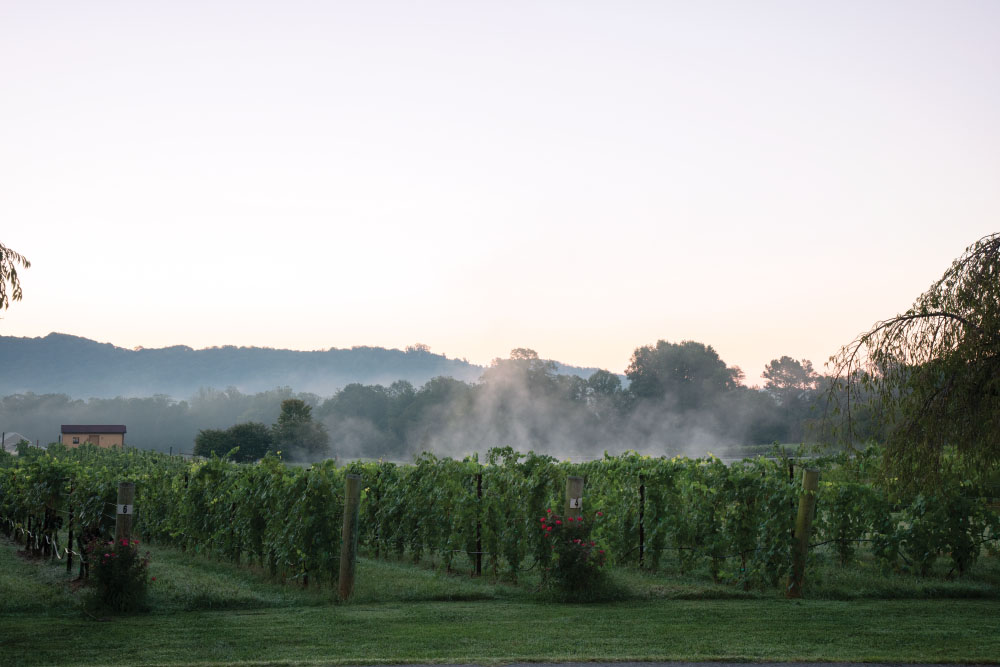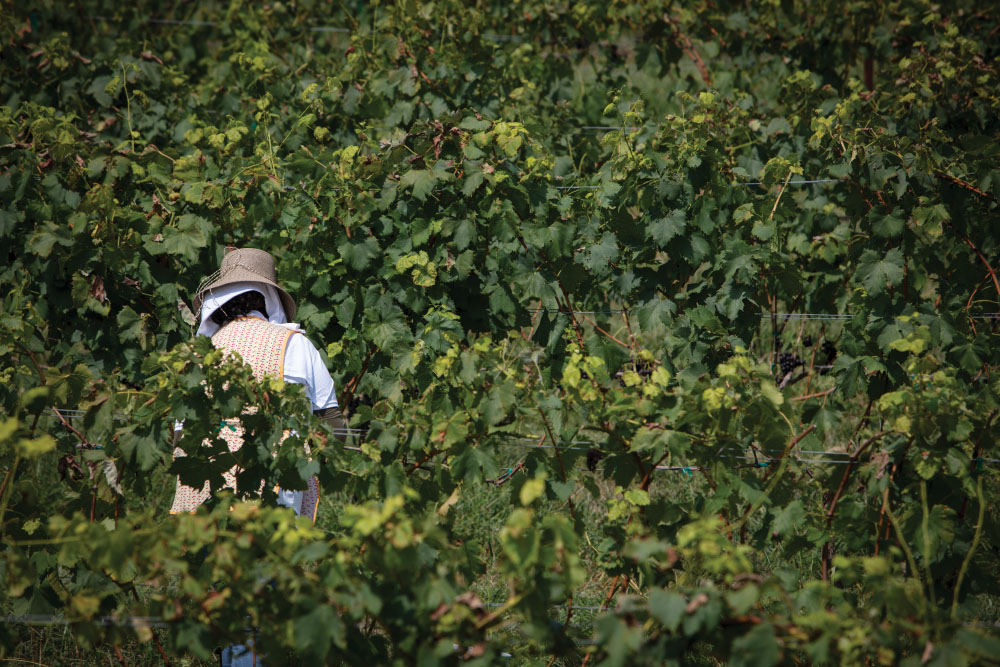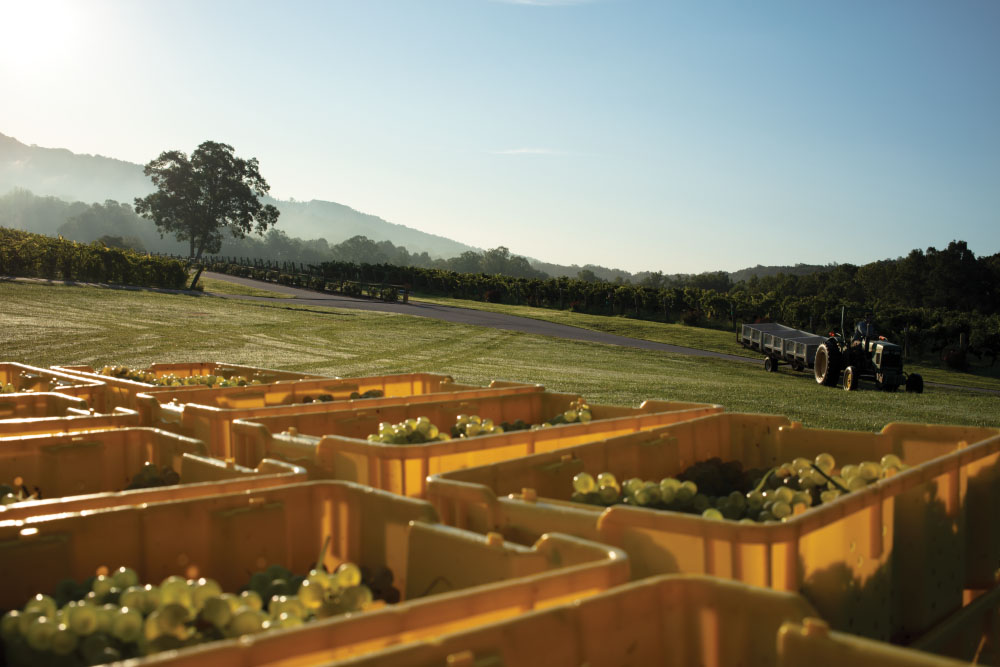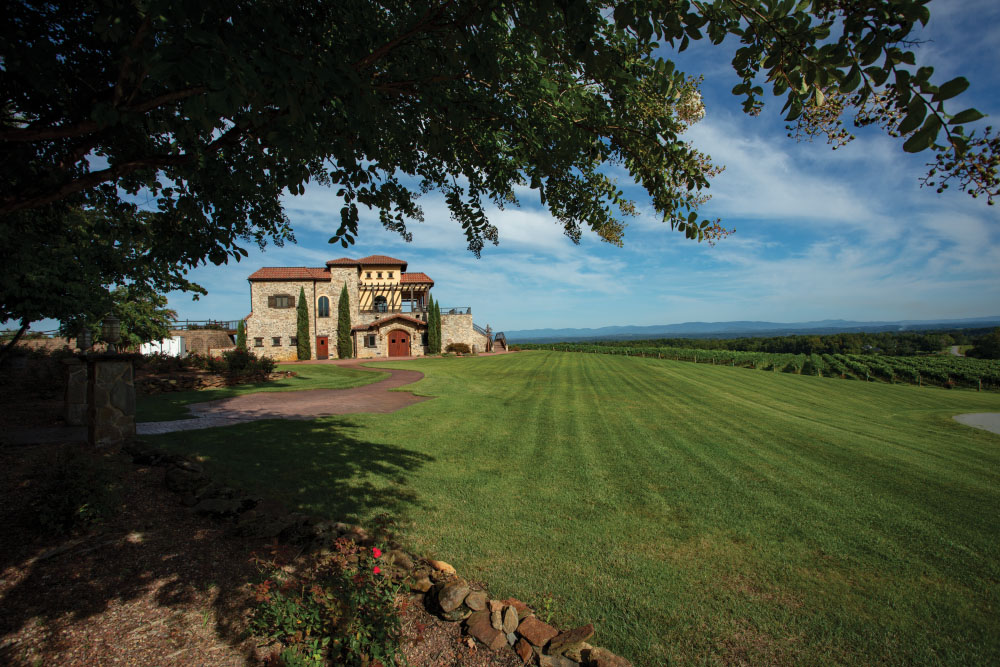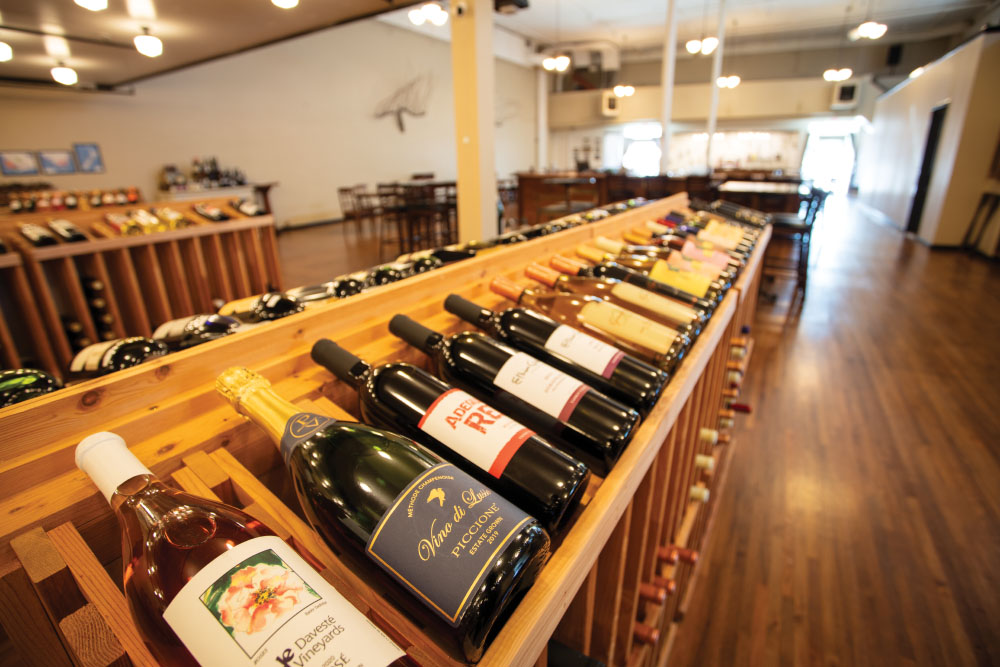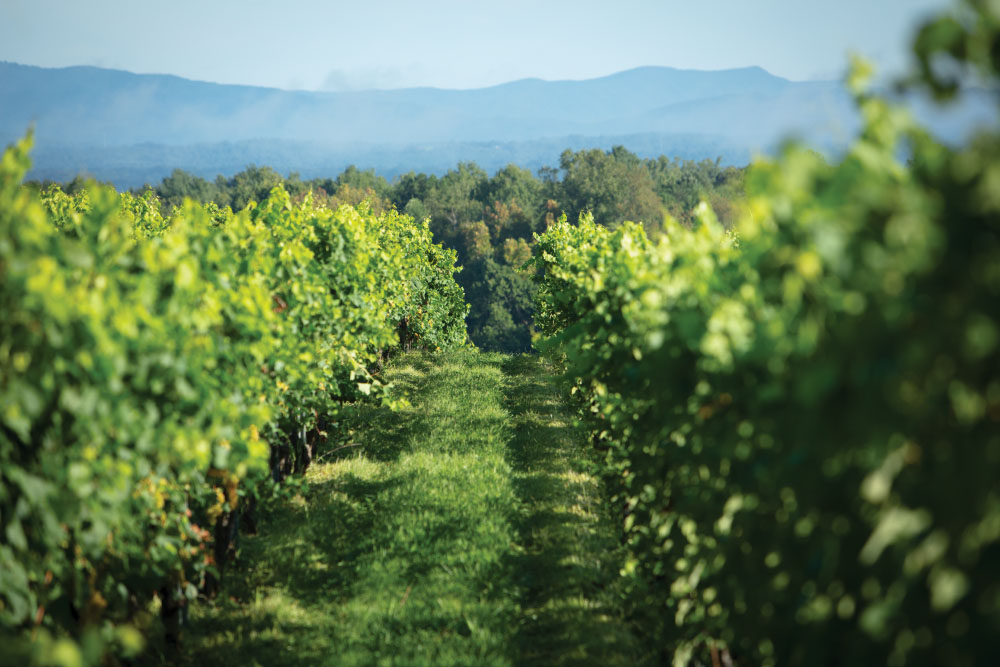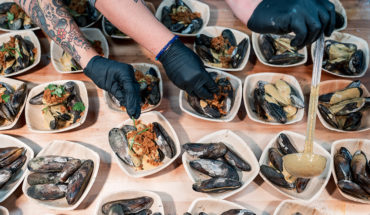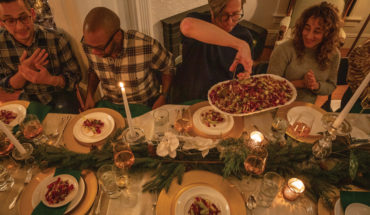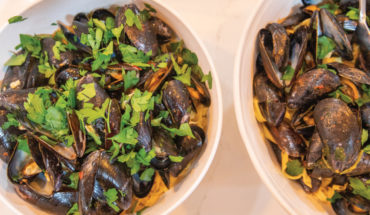European-style grapes are thriving in North Carolina’s Yadkin Valley, thanks to its unique climate and history.
by Finn Cohen | photography by Mark Wagoner
You wouldn’t notice it from the highway, but a little over two hours west of Raleigh, the soil is something special. And it’s not just the soil: it’s the slope of the land — lush, verdant hills at the foot of the Appalachians — and the quality of the air, still slightly humid but more temperate than most counties to the east. Even the way the sun hits is different.
You’ve entered North Carolina’s wine country. The Yadkin Valley, which for oenophiles is centered around the town of Elkin, is one of 258 American Viticultural Areas in the United States (for context: California has 142 AVAs, and only 25 other states have them). The area’s status as an AVA — meaning that the climate and terrain have been certified by the U.S. government for their wine-making properties — became official in 2003. There are currently more than 50 wineries operating in the region. And they produce a much different grape than the super-sweet muscadines found in much of eastern North Carolina.
“The Yadkin Valley is a direct analog of old-world Europe, dropped right here into North Carolina,” says Louis Jeroslow, one of the owners and operators of Elkin Creek Vineyard. The specific combination of latitude (on the same line as Monterey County in California), humidity (similar to Bordeaux, France), and red clay (akin to Tuscany, Italy) creates ideal conditions for European varieties of wine. “These vines don’t know they’re in North Carolina,” he says. “Their feet are in Italy, and they think they’re growing in France.”
Jeroslow and his wife, Carrie, first laid eyes on their vineyard as guests: in 2008, their friends Jennifer and Nick White got married at Elkin Creek, and the Jeroslows were an integral part of the ceremony. They quickly became friends with the owner, Mark Greene; Louis had been dabbling in winemaking, so there was a mutual interest. A year later, Greene contacted them and wanted to sell; he knew they’d be interested since they’d all hit it off so well. The Whites and the Jeroslows didn’t have a business background in wine — all four of them were working for the Blue Man Group in Las Vegas — but everyone was ready for a change.
“We had been in the arts for a really long time, and we all wanted to come back east,” says Carrie, who had worked for Blue Man Group in New York City in the 1990s. “Our visions were very much based on this place; it had everything that we really loved.”
There are 4 acres of grapes on the Elkin Creek property, and they produce about 1,200 cases a year. In their cozy tasting room, they offer brick-oven pizzas every weekend to go with their wine list. Highlights by the glass include the Viognier, a light white crafted in the Rhone style, and their take on Cabernet Sauvignon, a rich nod to France. Their “Adequate Red” is a deceptively named blend of Merlot and Syrah, recommended by the bottle with a winter meal.
Math and logistics prevent a Yadkin Valley wine from being widely available to consumers around the state, so it’s hard to get a taste of these grapes without making the trip. Unlike craft beer, which uses ingredients that can be bought online, fermented relatively quickly, canned, and shipped, wine-making is a laborious process that can be affected drastically by numerous factors during a growing season: hurricanes, late-spring frosts, pests, and drought.
Once the grapes are picked, crushed, and put in a tank, they need ample time to be turned into wine. If there’s only a few people involved in the process, then it’s a lot harder to drive around the state looking for distributors if you’re also running a tasting room and a grape farm.
“If you’ve bought a million dollars’ worth of stemmers and crushing pans and tanks and oak barrels and everything else, you’re going to maybe sell a guy like me a few cases here and there, but you can’t afford a giant wholesale,” says Jeremy Stamps, a co-owner of The Wisdom Table, a comprehensive wine bar located in an old Belk’s department store in downtown Elkin. “Most brewers are buying hops from Oregon and Washington, barley from the Dakotas — industrial-grade ingredients. They can produce beer on scale and send it to anybody and it’ll still be good.”
“It’s a pretty steep learning curve,” says Jim Zimmer, who with his wife, Tauny, owns Midnight Magdalena Vineyards several miles outside of Elkin. They quit their jobs in the energy industry and moved from Atlanta after buying 40 acres of land in 2010, opening the vineyard in 2012. Today, they’ve got 6 acres of vines planted, producing jammy reds (the 2018 Malbec is a standout) and crisp whites (try the Riesling). When they landed in the area, it was still relatively under the radar, which allowed them to adjust to the rigor of the growing process. While Jim got his hands into the soil, Tauny learned her craft through the viticulture program at Surry Community College in Dobson.
“It gives you a lot of guidance of how you can start up a vineyard and start up the overall business, even to the point of teaching you the winemaking techniques that you would need, or the grapes that you’re growing,” Jim says. “She would come back from school, we would talk about it.”
Jeremy Stamps and his wife, Krystle, moved to Elkin in 2017 from Orlando, where they both worked at Disney World (there seems to be a bit of a theme with entertainment and wine here). They’d fallen in love with the area when they got married there, but on visit after visit they saw a need for a gathering spot since many wineries stop offering tastings at 5 or 6 p.m. Now, The Wisdom Table sells wines by the bottle — about half of the shop’s stock is from North Carolina — and Jeremy serves as ambassador for the region, offering carefully curated flights that combine Old-World, New-World, and Yadkin-world wines. Even when he’s pouring a glass of a deep red, he’s offering a story about it — like Grassy Creek’s 2017 “To the Max” blend, named for the winemaker’s late dog, who saved his owner’s life by blocking him from going out in the vineyard one day before a lightning storm. Or McRitchie Winery & Ciderworks’ 2014 “Ring of Fire,” a dazzling Italian red that benefited from that year’s lack of hurricanes, rain, and early frost. Or the Vermentino Superiore, a luscious white from Raffaldini Vineyards, one of the region’s most scenic vineyards — there’s a Tuscan-style villa situated over rolling hills, where they grow the grapes that produce some of the region’s most powerful reds. (The Montepulciano Riserva, an earthy red, would pass as an Italian import at a blind taste test.)
The elephant in the room for winemakers around the world is climate change; as certain areas known for production get hotter and less accommodating for growing, regions less known for their grapes will inevitably get more attention. The Yadkin Valley stands to gain from this shift, which, according to Louis Jeroslow, would be a bit of a full circle for the whole state.
“Somewhat lost in history is that winemaking in North Carolina goes all the way back to the colonies — this was the wine region of the United States before the western expansion, up until Prohibition,” he says. “You have old-world Europe dropped right here in the foothills, and we’re starting to finally, slowly, see more attention among the public, among the consumers.”
“It feels very much like Sonoma in the 1960s, when the locals just didn’t get it, and people had not really heard about it: Why are you growing grapes, isn’t this where you guys grow almonds and citrus?” he says. “People could say the same thing here: Why are you growing grapes? Isn’t this where people grow corn and tobacco and soybeans?”
But sitting on Midnight Magdalena’s porch looking into the Blue Ridge Mountains with a glass of their Malbec, or wandering through the sun-dappled vines at Raffaldini between sips of the Riserva, the answer is clear.
__
This article originally appeared in the November 2021 issue of WALTER magazine.

